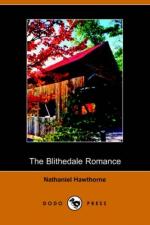After several such visits to the window, I found myself getting pretty well acquainted with that little portion of the backside of the universe which it presented to my view. Over against the hotel and its adjacent houses, at the distance of forty or fifty yards, was the rear of a range of buildings which appeared to be spacious, modern, and calculated for fashionable residences. The interval between was apportioned into grass-plots, and here and there an apology for a garden, pertaining severally to these dwellings. There were apple-trees, and pear and peach trees, too, the fruit on which looked singularly large, luxuriant, and abundant, as well it might, in a situation so warm and sheltered, and where the soil had doubtless been enriched to a more than natural fertility. In two or three places grapevines clambered upon trellises, and bore clusters already purple, and promising the richness of Malta or Madeira in their ripened juice. The blighting winds of our rigid climate could not molest these trees and vines; the sunshine, though descending late into this area, and too early intercepted by the height of the surrounding houses, yet lay tropically there, even when less than temperate in every other region. Dreary as was the day, the scene was illuminated by not a few sparrows and other birds, which spread their wings, and flitted and fluttered, and alighted now here, now there, and busily scratched their food out of the wormy earth. Most of these winged people seemed to have their domicile in a robust and healthy buttonwood-tree. It aspired upward, high above the roofs of the houses, and spread a dense head of foliage half across the area.
There was a cat—as there invariably is in such places—who evidently thought herself entitled to the privileges of forest life in this close heart of city conventionalisms. I watched her creeping along the low, flat roofs of the offices, descending a flight of wooden steps, gliding among the grass, and besieging the buttonwood-tree, with murderous purpose against its feathered citizens. But, after all, they were birds of city breeding, and doubtless knew how to guard themselves against the peculiar perils of their position.
Bewitching to my fancy are all those nooks and crannies where Nature, like a stray partridge, hides her head among the long-established haunts of men! It is likewise to be remarked, as a general rule, that there is far more of the picturesque, more truth to native and characteristic tendencies, and vastly greater suggestiveness in the back view of a residence, whether in town or country, than in its front. The latter is always artificial; it is meant for the world’s eye, and is therefore a veil and a concealment. Realities keep in the rear, and put forward an advance guard of show and humbug. The posterior aspect of any old farmhouse, behind which a railroad has unexpectedly been opened, is so different from that looking upon the immemorial highway, that the spectator gets new ideas of rural life and individuality in the puff or two of steam-breath which shoots him past the premises. In a city, the distinction between what is offered to the public and what is kept for the family is certainly not less striking.




